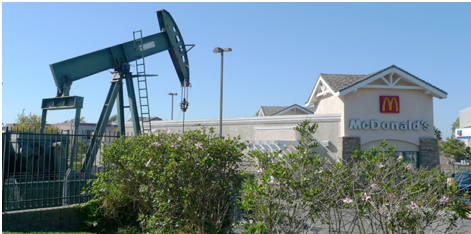CommentsLARGEST URBAN OIL FIELD--With 840 miles of beautiful coastline and palm trees swaying in the breeze, “toxic” is not the first word that comes to mind when one thinks of California. Yet, in spite of its reputation as a progressive environmental state, California’s toxic affair with oil and gas has been hiding in plain sight.
Nowhere is this more apparent than in Los Angeles, the nation’s largest urban oil field. Though it is the second most populous city in the country, LA is still the wild, wild west when it comes to oil development. Active oil wells dot the cityscape, connected by a spider web of pipelines carrying oil, explosive fumes, and corrosive acids directly under homes. Worst of all, these oil wells have a devastating impact on Angelenos’ long-term health.
I went on a “toxic tour” of LA and witnessed what it looks like when extreme fossil fuel extraction collides with the places where people live, work, and play. Our reliance on fossil fuels puts real communities at risk across the city. Extreme oil extraction injects a toxic mixture of chemicals into the ground to stimulate oil wells in a manner similar to fracking, and the emissions can cause headaches, nosebleeds, respiratory ailments, inter-generational reproductive harm, and even cancer for surrounding neighbors.
Last year, the state of California mandated an independent scientific assessment of oil and gas development. They found that in areas of high population density — such as South Los Angeles — oil drilling poses elevated health risks because more people are exposed to toxic air contaminants. The 580,000 Angelenos living less than a quarter mile from an oil well are subjected to the dangers of neighborhood drilling every single day. L.A.’s oil problem is more than just a problem; it’s a crisis of human health and safety.
On that eye-opening tour, I met young Nalleli Cobo — a South L.A. teenager who has been fighting neighborhood drilling since she was sickened at age nine by the AllenCo Energy drill site across the street from her home. For years, she was in and out of hospitals trying to get answers to the long list of symptoms she experienced daily. On some days, Nalleli had to be carried to the car to go to the doctor because painful body spasms made it difficult to move.
After hundreds of community complaints, USEPA investigators finally conducted an inspection — only to fall ill immediately upon entering the drill site. Though they were temporarily forced to shut down, AllenCo is now working to reopen the drilling site this year.
Make no mistake about it, LA’s oil drilling is toxic.
Shockingly, Nalleli’s story isn’t unique. California is the third largest oil producing state in the nation and over 75% of the active oil wells in Los Angeles are within 2,000 feet of homes, schools, or hospitals, where they pose the gravest threat to human health.
Concrete walls may try to shield extreme extraction from neighbors’ eyes, but they are useless at protecting them from poisonous fumes. It’s common to see workers in hazmat suits monitoring rigs on one side of a wall, while families on the other side remain completely unprotected sitting around their dinner table.
That’s why Nalleli, fueled by her sense of duty to protect her neighbors and fellow Angelenos, wants to hold her elected leaders accountable for allowing the oil industry to pollute her community. As a member of the coalition called Stand Together Against Neighborhood Drilling (STAND-LA), she has spoken at press conferences with Senator Barbara Boxer, organized health surveys to track symptoms in her community, and serves as a youth plaintiff in a lawsuit against the City of L.A. for violating her civil rights. Nalleli has even taken the fight to Pope Francis, asking him to urge the Archdiocese of Los Angeles to stop leasing their land to AllenCo Energy and other oil companies.
Fortunately, Nalleli is not alone in this fight. This Saturday, thousands of Californians will gather to support the communities on the front lines of neighborhood drilling at the March to Break Free from Fossil Fuels. They will gather at Los Angeles City Hall to call on Mayor Eric Garcetti and City Council President Herb Wesson to put an end to urban oil drilling.
Confronting the mighty oil industry is not an easy task, but Mayor Garcetti and President Wesson need only follow the courageous lead of Nalleli and others in STAND-L.A. who have been fighting for years. LA’s elected leaders have the opportunity to send a clear signal to the rest of the nation with a victory in this climate battle. We must keep oil in the ground. Stand with Nalleli and families like hers on the front lines at this critical moment in history.
(Mark Ruffalo is an Oscar-nominated actor and climate change activist. This perspective was posted most recently at Huff Post.)
-cw
Explore
Our mission is to promote and facilitate civic engagement and neighborhood empowerment, and to hold area government and its politicians accountable.

 CityWatch Los Angeles
Politics. Perspective. Participation.
CityWatch Los Angeles
Politics. Perspective. Participation.
18
Fri, Apr















